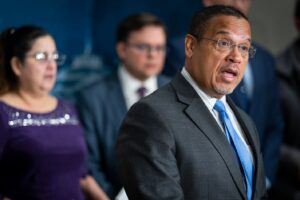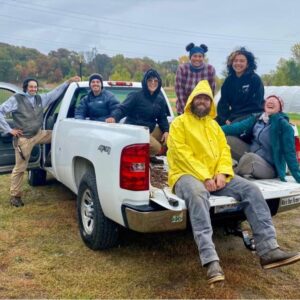
Boundary Waters Canoe Area Wilderness
BY DEBRA KEEFER RAMAGE
The battle plan against Mother Earth
Project 2025 — which is apparently the project plan for our present federal administration now — is particularly hostile to the planetary wellbeing of our home planet. It goes way beyond mere climate denial.
In an attempt to get a handle on the scope of the changes wrought just in the first three months, I searched for and found a website that is monitoring all of Trump’s Executive Orders (EOs) and classifying them by policy area. The chart is created by a nationwide law firm, Holland and Knight, and you can read it for yourself here — tinyurl.com/DKRatSSP-Trump-EOs.
Who is commanding this battle and what do they gain?
Yes, technically, DJT (to keep from having to type his name) is the Commander. But it’s widely known and accepted that the playbook his administration is following is almost entirely the product of a loose cohort working under the name of Project 2025.

MN’s Keith Ellison and other State Attorney Generals are suing the Trump Administration over unconstitutional EO’s
Project 2025 got started officially in April 2022, but in a sense, it goes back to near the founding of the Heritage Foundation— its principal source — which published a whole series of similar documents under the title “Mandate for Leadership: The Conservative Promise.” Project 2025 is the ninth iteration of the Mandate for Leadership series and was published in April 2023.
You can find out way more about Project 2025 than you can ever assimilate with a normal human brain at this copious website whatisproject2025.net. There is even a link to the entire document, if you have the stomach to read it.
Since DJT’s inauguration, some additional figures have appeared on the scene. While the authors of Project 2025 appear to be in it primarily for power, there are a few who are using the current administration as a business opportunity.
A case in point is here in the Great Lakes region with the Line 5 pipeline replacement project. This is now considered to be an over $1.5 billion contract, which was awarded with no bid, and fast-tracked, without an Army Corps of Engineers environmental review. The recipient of the contract is Tim Barnard, who along with his wife, gave $1 million to DJT’s campaign and an aggregate of about $1 million to other Republican candidates, including J. D. Vance (who was himself a big contributor to Project 2025.) So he “bought” a billion dollars’ worth of business for the low, low price of just $2 million.

Movement to close HERC
The Line 5 replacement involves constructing a high-pressure tunnel (at the highest pressure in the world if allowed) underneath the Mackinac Strait which connects Lakes Michigan and Huron. Construction has been held up for years, and activists hope to get the old pipeline shut down rather than replaced. The Corps of Engineers review is their best hope of stopping it.
Why is Project 2025 so key to understanding the right’s war on the environment?
Project 2025 covers more than just environmental issues, of course. But as I will show in the policy sections below, environmental harm is a side effect of many of the other schemes. Indeed, it’s a basic premise among the left that capitalism and wealth disparity itself is the main driver of climate change, species destruction, and pollution — and powering capitalism and increasing wealth disparity is the main thrust of Project 2025. Or as the late environmentalist philosopher John Muir pointed out, “When we try to pick out anything by itself, we find it hitched to everything else in the Universe.”

Dream of Wild Health — food sovereignty and native foodways
For example, EOs aimed at dismantling Diversity, Equity, and Inclusion in education will end up shutting down vital academic research, making stopping climate chaos or protecting vital habitats more difficult, if not impossible. Imposing tariffs on imports of food will invite retaliatory tariffs (which have already happened in the case of Canada and China) which in turn will drive small, family, and diverse farmers out of business, growing environmentally destructive Big Ag even more.
Major battlefield — energy policy and deregulation
Climate denialism is crucial to the conservative defense of capitalism. The following Executive Orders (with dates shown) directly harm or have potential to harm the environment:
• Unleashing American energy (1/20/2025)
• Putting America first in international environmental agreements (1/20/2025)
• Putting people over fish (1/20/2025)
• Declaring a national energy emergency (1/20/2025)
• Temporary withdrawal from and review of offshore wind leasing (1/20/2025)
• Ending forced use of paper straws (2/10/2025)
What are some current and expected effects of DJT’s actions on the environment in the Midwest, Minnesota, the Twin Cities and Minneapolis?

Offshore wind leasing
Writing a subsection on environment and energy for a Feb. 21 MN Star Tribune article, “Trump’s First Month,” Walker Orenstein wrote: “The Minnesota Department of Commerce told a panel of state lawmakers Monday that its agency has about $1 billion in federal funding for energy programs under contract, much of which is currently frozen. The energy industry has also won far more than $1 billion in federal grants, mainly through the Inflation Reduction Act or the bipartisan infrastructure law. ‘Those also seem to be currently frozen, said Pete Wyckoff, deputy commissioner of energy resources.’
“That includes $812 million for Great River Energy to procure a vast amount of renewable energy, saving the utility’s customers money, but Great River said no money was pulled because it wasn’t available yet to be spent.
“’The money on pause also includes $52 million for a Minneapolis-based company that builds magnets crucial to everyday life that don’t rely on materials largely sourced in China, Wyckoff said.’”
In a more recent article in MinnPost, Ana Radelat wrote about DJT’s invoking of a 1950 Act that directs the U.S. to produce more “critical minerals” (in light of the Cold War, which is supposed to be over now.) “An executive order Trump signed late Thursday gives his administration emergency powers to prioritize mining on public lands, which could include the Superior National Forest, a watershed for the Boundary Waters Canoe Area Wilderness.”

Panel from Humphrey Institute
On Feb. 4, the Humphrey Institute at the University of Minnesota held a panel where four policy area experts shared perspectives on the DJT acts so far. Daniel Scholten — visiting assistant professor and research associate at Clingendael’s EU & Global Affairs Unit, in the Netherlands — gave the view on the environment and energy policy. Here are some outtakes from his remarks: “Let me first state that the U.S. doesn’t have an energy emergency …Why purposely stop all this renewables development? … What troubles me is this flip-flopping, and because I sit in these meetings with European think tanks, they are very hesitant to make deals with the U.S. … The U.S. is moving into climate isolation, and we will see whether this is beneficial for the U.S. as a whole. I doubt it.”

Mackinac Straits and proposed pipeline path
Who is fighting back?
I wish I could tell you that the cavalry is coming, but clearly, it’s not. While groups defending immigrant’s rights are fired up by the onslaught against them, national environmental groups have been more quiet, apart from the usual pleas for money. One slight sign of hope is ad hoc groups of fired or muzzled federal employees — such as park rangers and meteorologists and public health workers — who are standing up to the cuts and firings.
Personally, I am continuing to focus more on hyperlocal projects and issues. I am under no illusion that the Trump administration won’t get around to us, but it will take longer, and we can be planning and growing strength to prepare for it. Current projects I know about, and support, include pressuring Hennepin County to close the HERC (garbage burner), Dream of Wild Health (a Native American youth, farming, education, and food sovereignty initiative) and promoting sustainable food sources such as waste reduction, community gardens and municipal composting, and community-supported agriculture (CSAs.)























greetings from California — found my way here via my environmental news feed scan.
i came for the turn of phrase “climate-denying, National Park-wrecking clown posse administration,” and/but stayed for a well-written, thorough, and helpful piece.
many thanks to you for this.